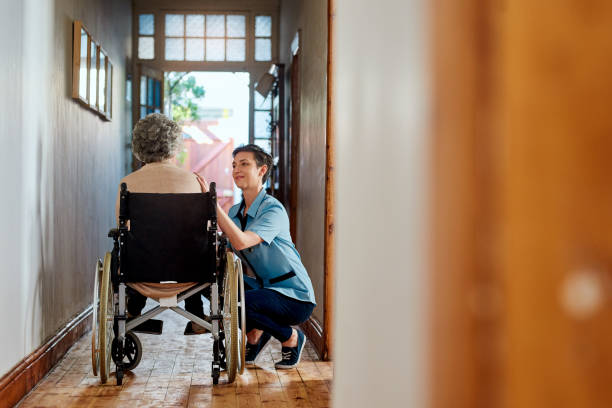There is no denying that seniors face many challenges with regard to their physical and cognitive abilities as they age. Common disabilities for seniors include vision impairment, hearing loss, mobility issues, memory problems, arthritis, depression, and anxiety. As these issues can often interfere with everyday activities such as driving or participating in social activities, it is important for seniors to recognize the signs of these common disabilities and seek out the help they need.
Vision Impairment
Vision impairment is one of the most common disabilities among the elderly, with it affecting upwards of 36 million seniors in the United States alone. Due to the aging process, many seniors suffer from conditions such as cataracts, glaucoma, and macular degeneration, which can all lead to vision loss.
Vision impairment can significantly decrease a senior’s quality of life, as tasks that were once simple can become complicated or sometimes even insurmountable. Fortunately, there are tactics and strategies that can help improve the quality of life for our aging population suffering from vision impairment.
Assistive technology such as voice assistants, large print books, and magnifying glasses are all available to help seniors gain access to information and remain engaged in their daily activities. Additionally, occupational therapists can work with seniors to develop organizational techniques and provide guidance on how to accommodate everyday tasks like cooking and navigating unfamiliar spaces. Vision impairment does not have to be a detriment but rather an opportunity for growth if properly addressed!
Hearing Loss
Hearing loss is an incredibly common disability among seniors, affecting two-thirds of adults aged 70 and over. It can seriously interfere with a person’s day-to-day activities, making it difficult to engage in conversations, pay attention to warnings and threats, enjoy music and other sounds, or pursue hobbies like watching television. Fortunately, there are a variety of hearing aids and other assistive devices that can help seniors improve their quality of life.
These devices range from basic models that help filter out background noise to sophisticated devices that amplify sound in real-time. In addition to devices, there are various strategies available for the prevention of hearing loss, such as avoiding loud noises and wearing protective gear when engaging in activities with the potential for ear damage. By properly addressing hearing loss in its early stages, seniors can better enjoy all the sounds they grew up loving.
Mobility Issues

Mobility issues can be an incredibly difficult challenge for seniors, particularly those with chronic conditions. One of the most common mobility-related disabilities is the difficulty in walking independently or long distances, which drastically affects their ability to participate in daily activities like grocery shopping or socializing with friends. Additionally, it may prevent many from completing household tasks such as managing laundry.
Thankfully, modern technology and resources have offered strategies that help seniors manage their mobility issues and maintain their quality of life. From assistive devices like canes, walkers, and scooters to home modifications like stair lifts or wheelchair ramps – there is targeted assistance available for those needing extra support. Understanding how to take advantage of these tools is critical in enabling seniors to live more independent lives and continue fully engaging in day-to-day activities.
Memory Problems
Memory problems can seriously impede the quality of life as seniors age. One study by the American Psychological Association revealed that nearly 60 percent of people over the age of 65 are affected by cognitive decline, including memory loss – making it one of the most common disabilities among this demographic. Unfortunately, it can be hard to detect at first and often goes unchecked until a severe issue arises.
The elderly may feel embarrassed when confronting the issue and hesitant to seek help from family members or medical professionals. It’s important for seniors and those who care for them to recognize signs of memory decline early and discuss treatment options that might work best for each individual situation. With a proactive approach, seniors will be better enabled to carry on with daily activities despite any cognitive impairments.
Arthritis
As the body ages, we become more susceptible to a myriad of conditions, including arthritis. This musculoskeletal disorder is the most common disability affecting seniors in the United States, with almost 52 million adults over age 18 living with arthritis. With age comes reduced functioning joints, cartilage degeneration, and increased pain due to swelling caused by inflammation – all of which are hallmarks of arthritis and its various forms, such as rheumatoid arthritis and osteoarthritis.
It’s important for seniors to maintain a healthy lifestyle through diet and exercise to reduce their risk or slow the progression of this disabling condition. A proactive approach through proper management can help people maintain an active lifestyle despite managing their arthritis throughout the aging process.
Depression and Anxiety
Depression and anxiety are two of the most commonly diagnosed medical conditions for seniors. While these challenges can be caused by aging, life events, or changing health status, unresolved tensions between generational expectations and the freedom to grow into their own identities can play a role in senior anxiety and depression, too. Sufferers of these conditions are more than twice as likely to visit their primary care physician for medical treatment compared to seniors who do not have mental health issues.
Fortunately, there are many ways for seniors to combat their depression and anxiety that involve talking with a licensed mental health professional or engaging in physical activity such as yoga or pilates. Cognitive behavioral therapy has also been shown to work well with older adults suffering from depression and anxiety – especially when combined with medication. With the right help, seniors can manage and even put an end to their depression and anxiety.
Bottom Line
As the population continues to grow, it’s important for seniors to take proactive steps toward improving their quality of life. With targeted assistance and the right strategies, aging individuals can continue living active lives and maintaining independence despite facing various medical conditions or disabilities. It’s critical for seniors to stay up-to-date on the latest treatments and resources available to them so that they can stay healthy and happy with age.
By understanding the common conditions among seniors and taking preventative steps, everyone will be better equipped to manage any difficulties that come with aging and lead more fulfilling lives as they grow older. Ultimately, a proactive approach towards aging is key for ensuring good quality of life for seniors.


Recent Comments